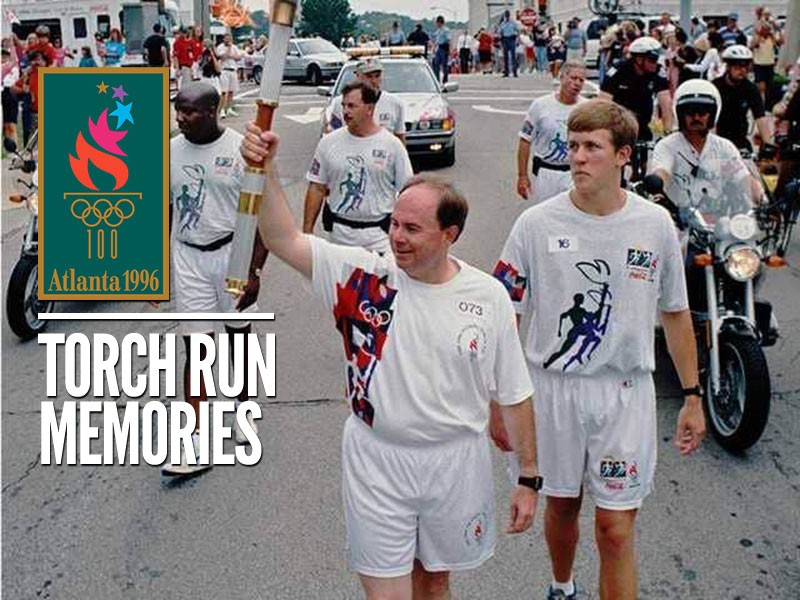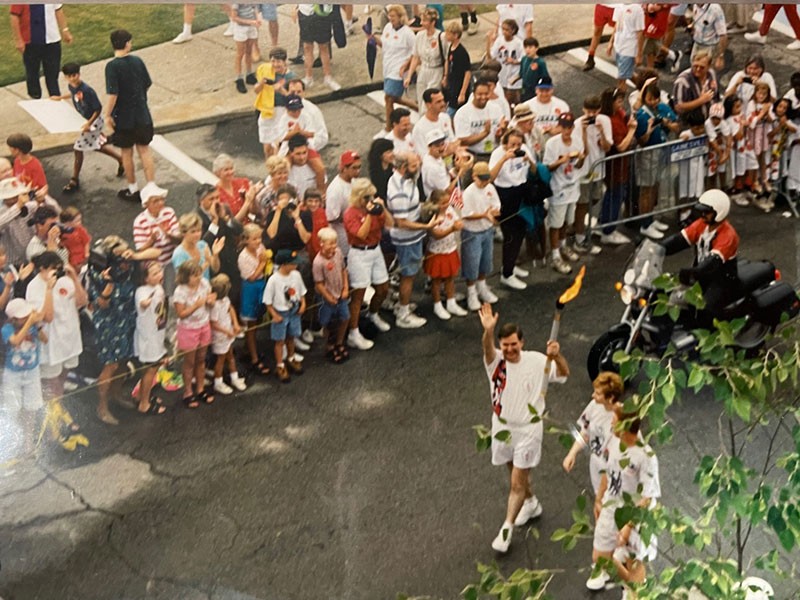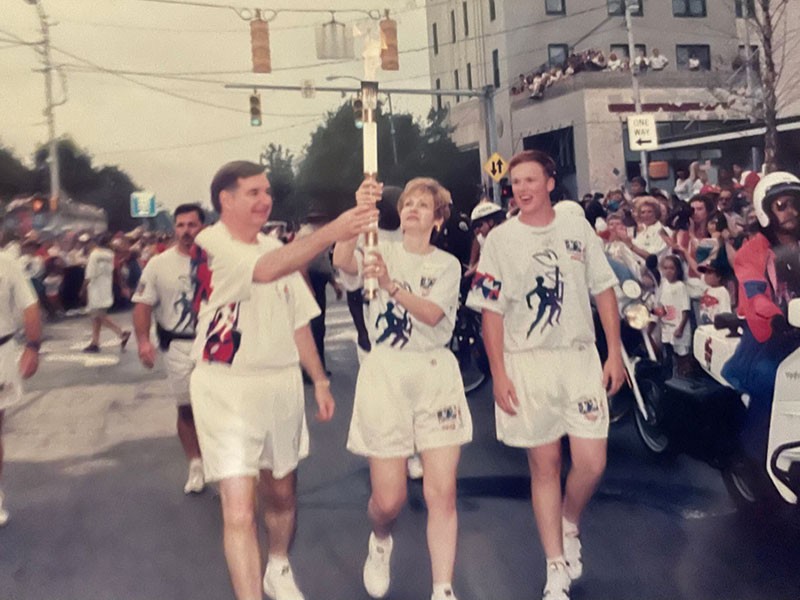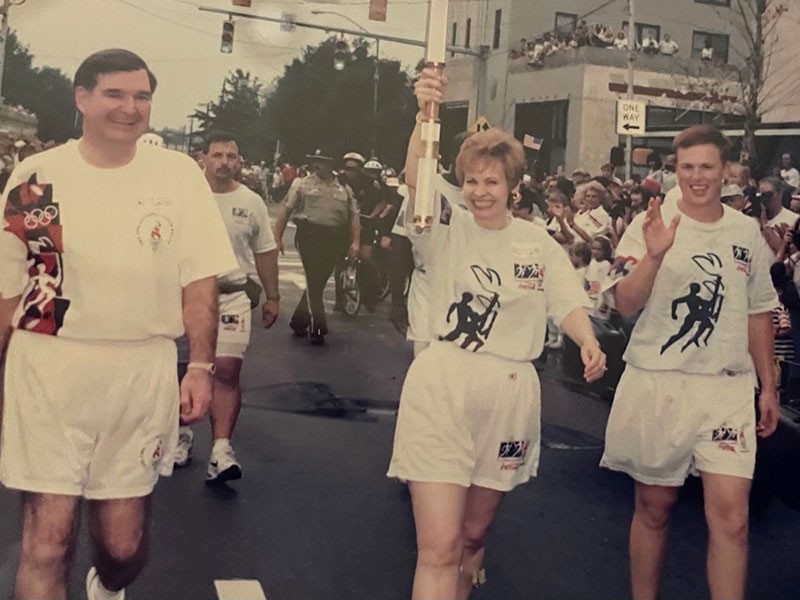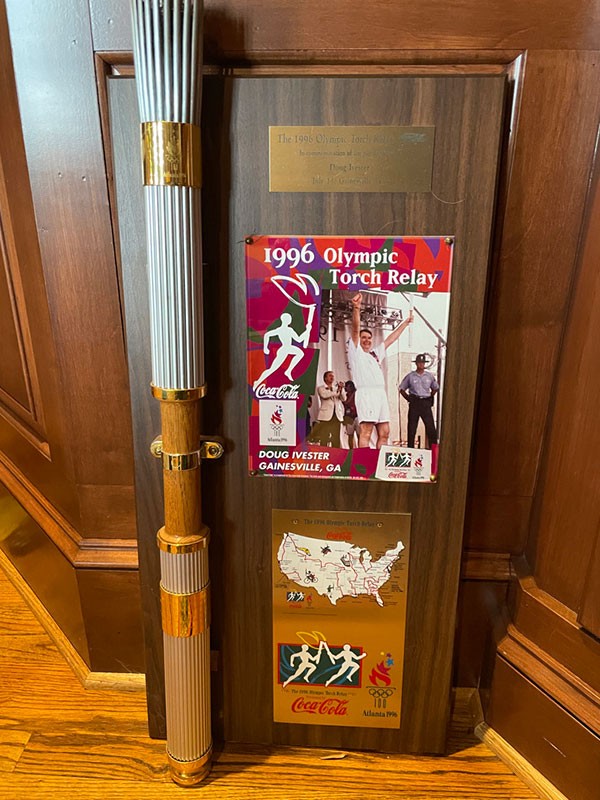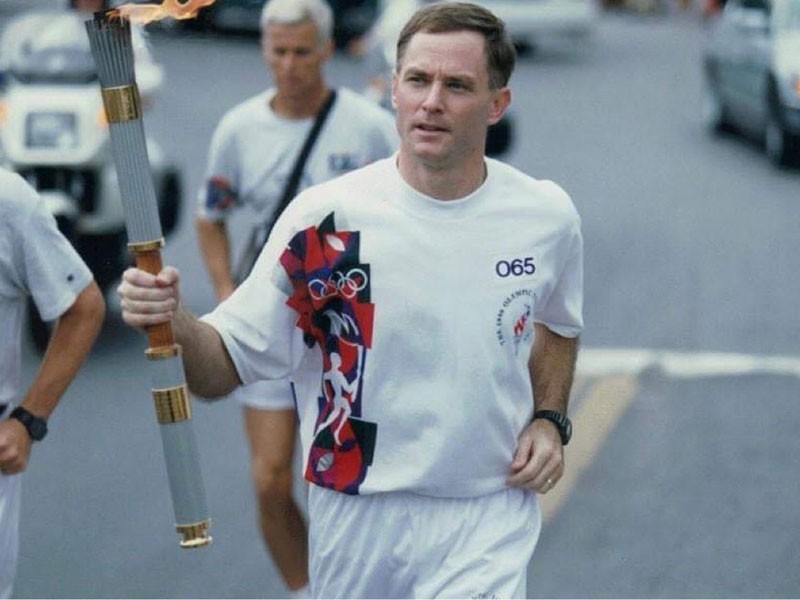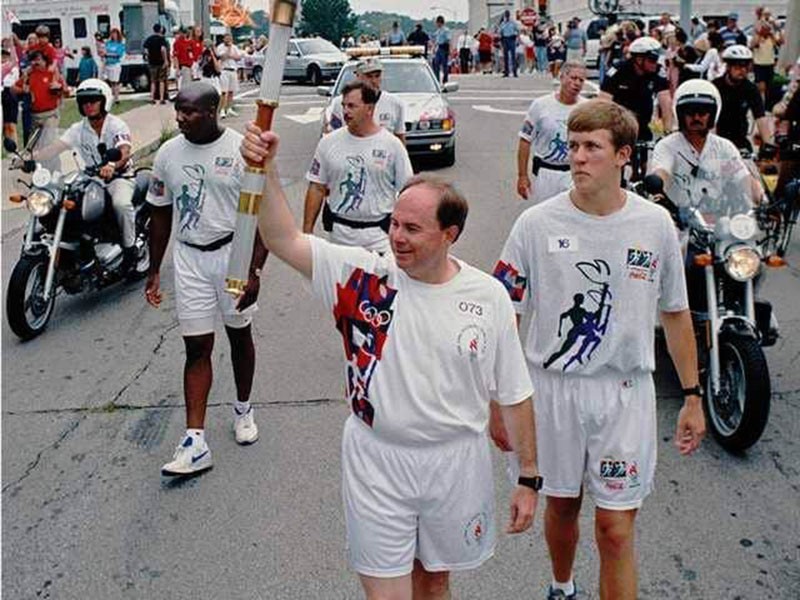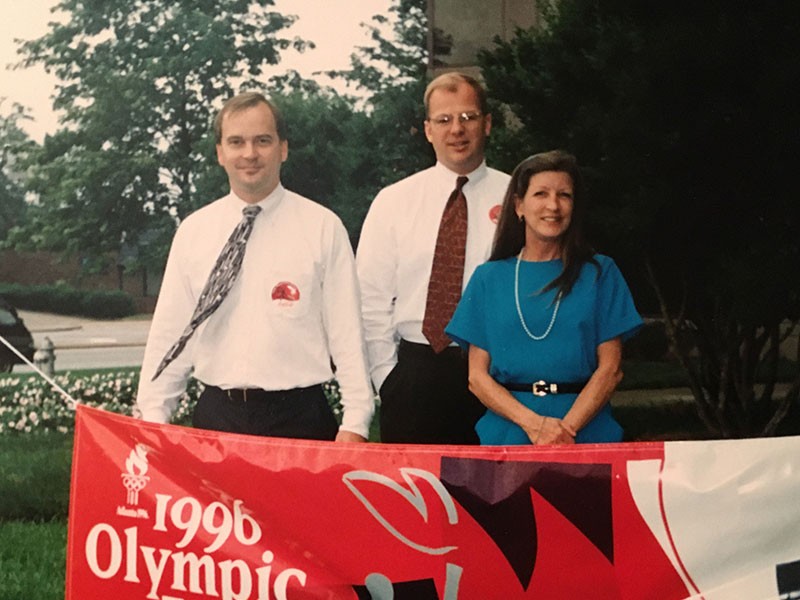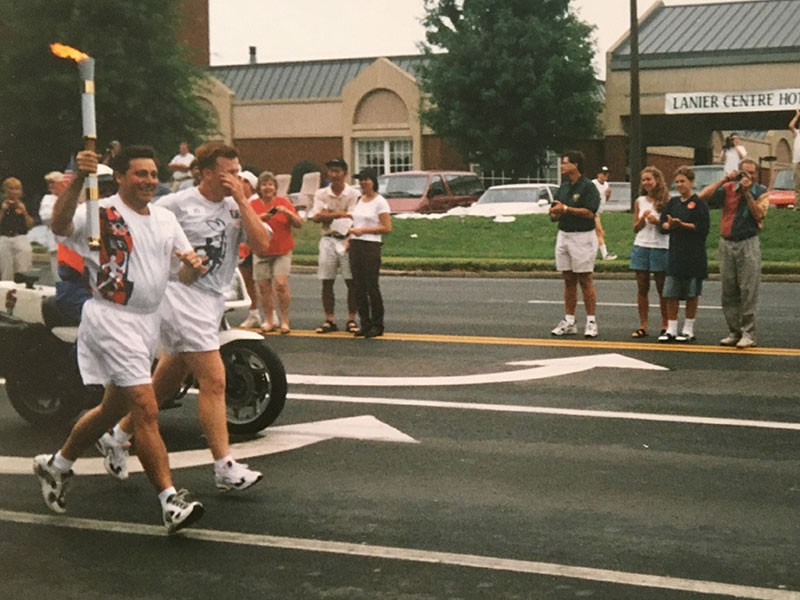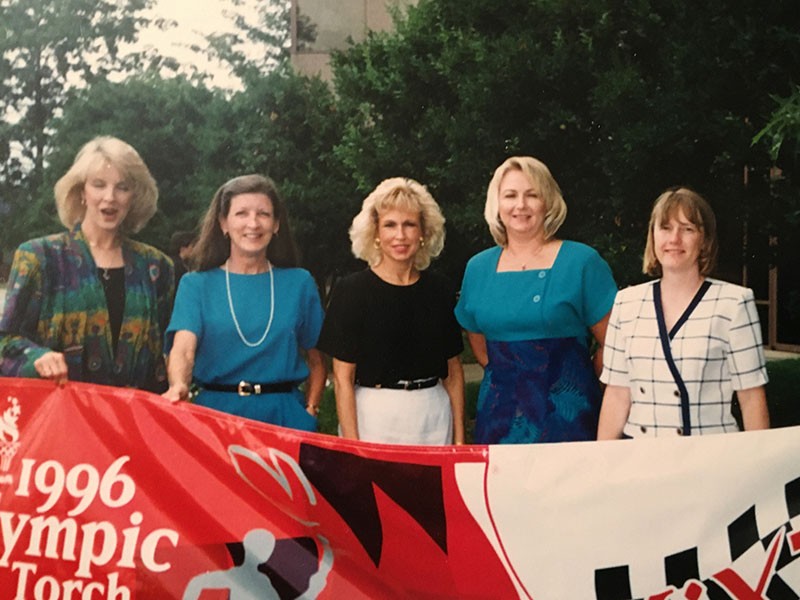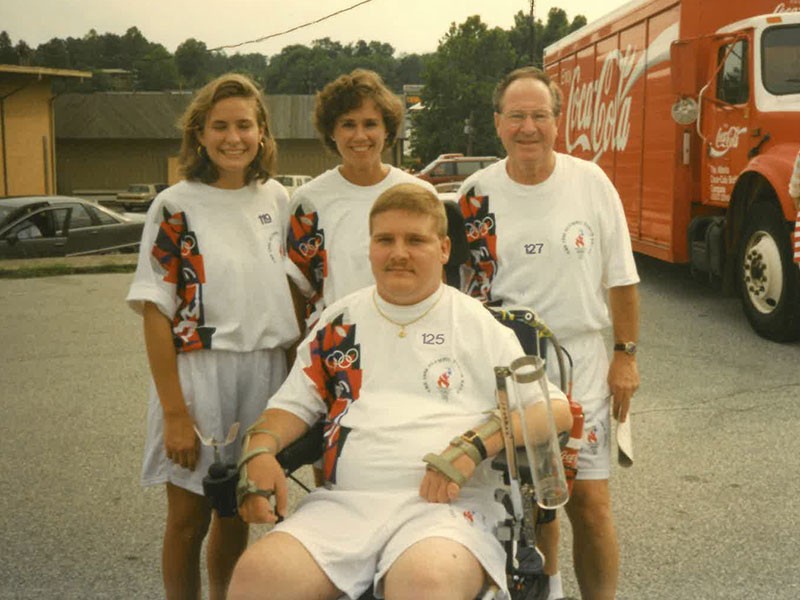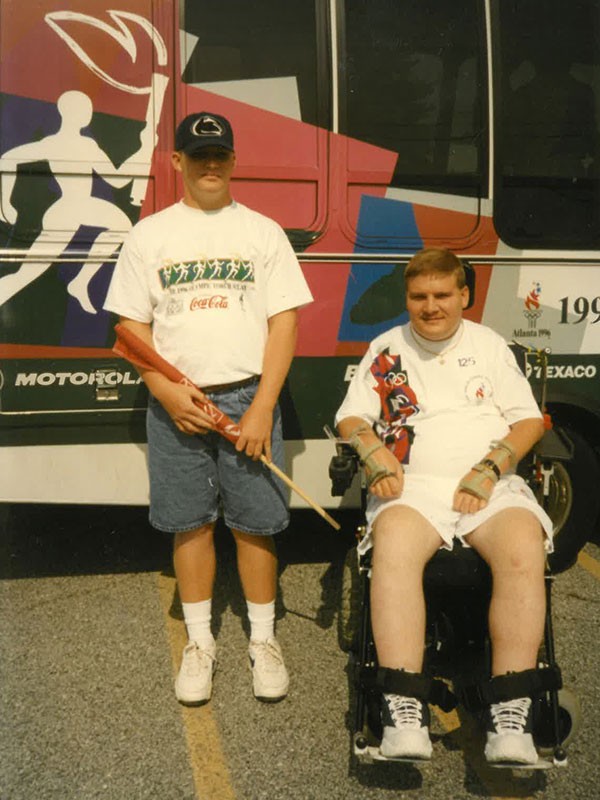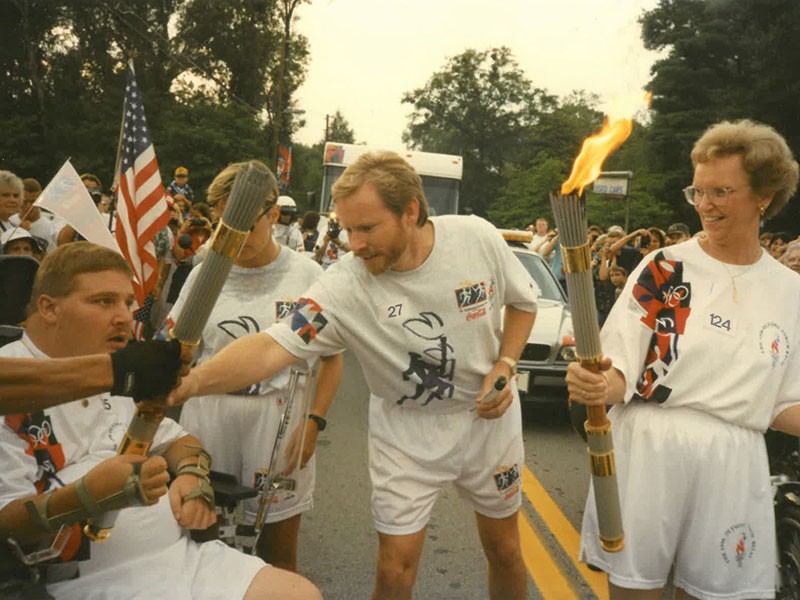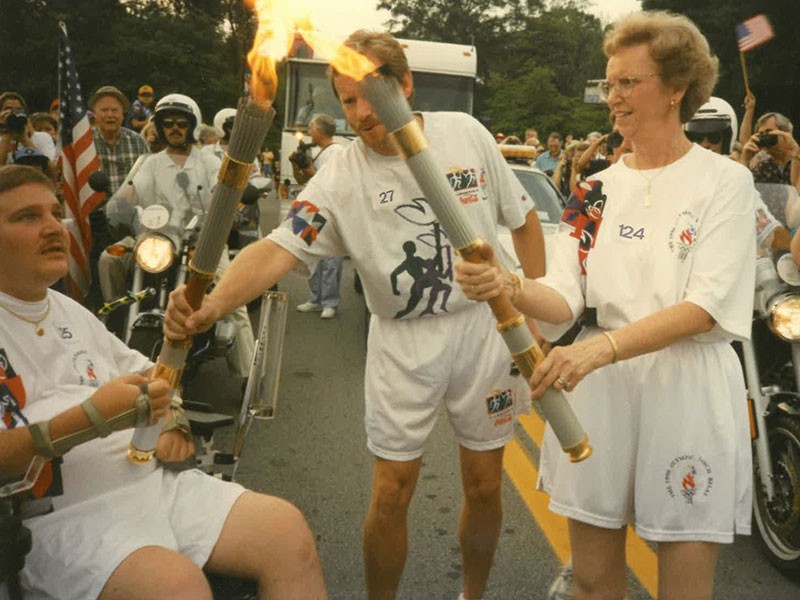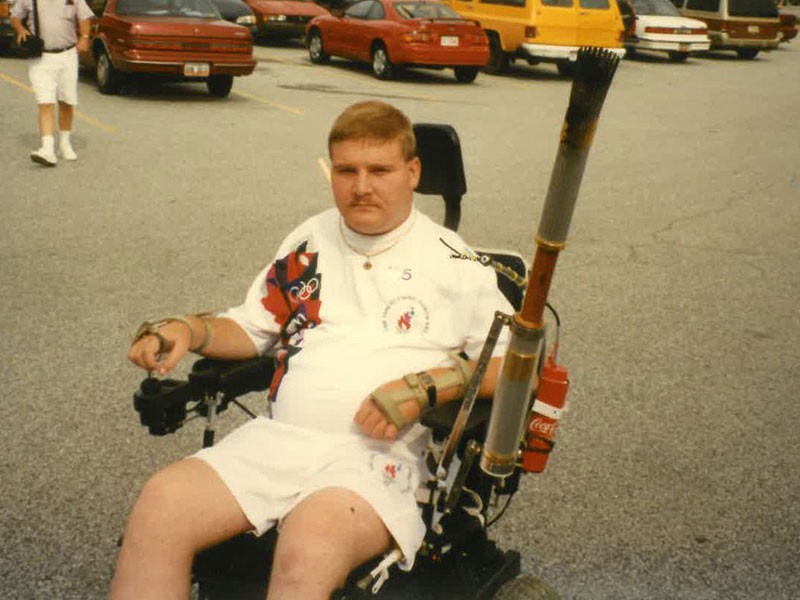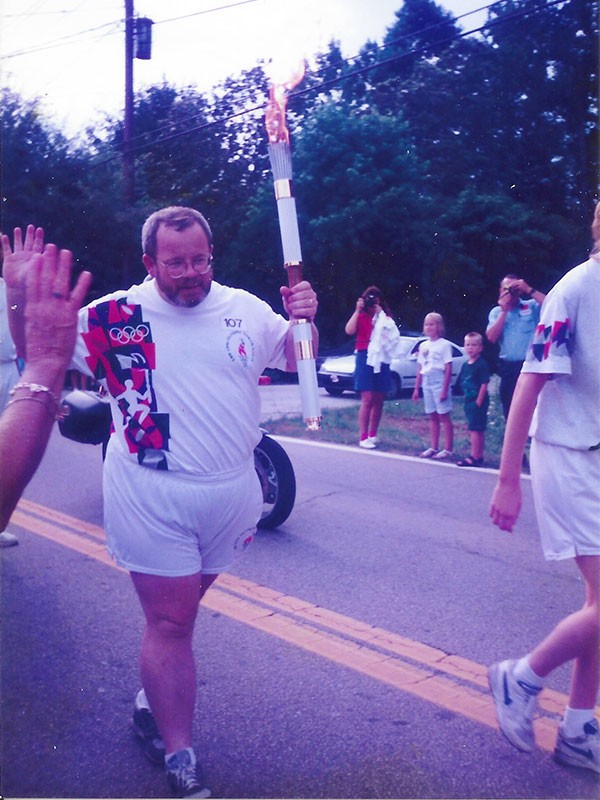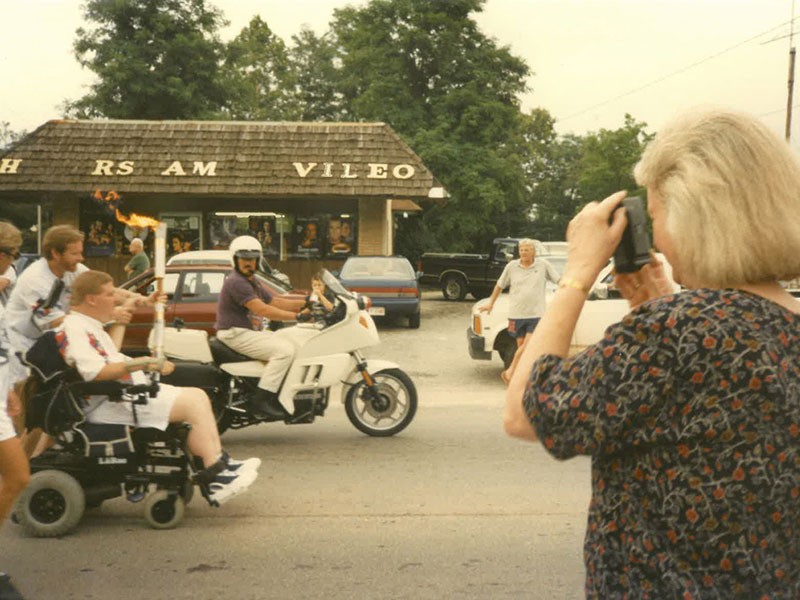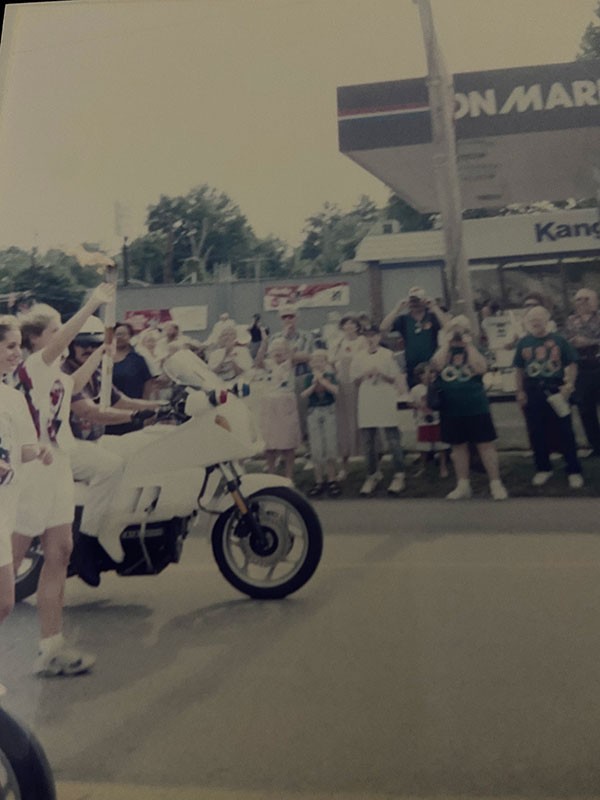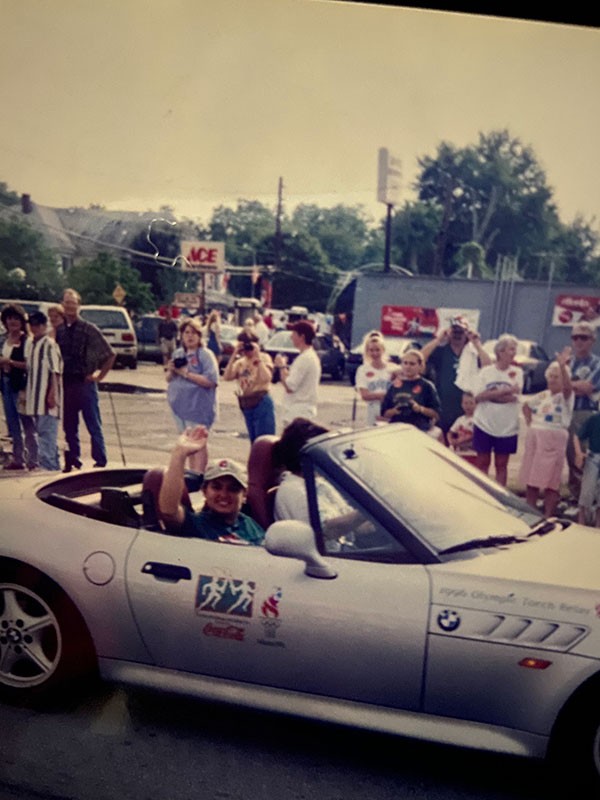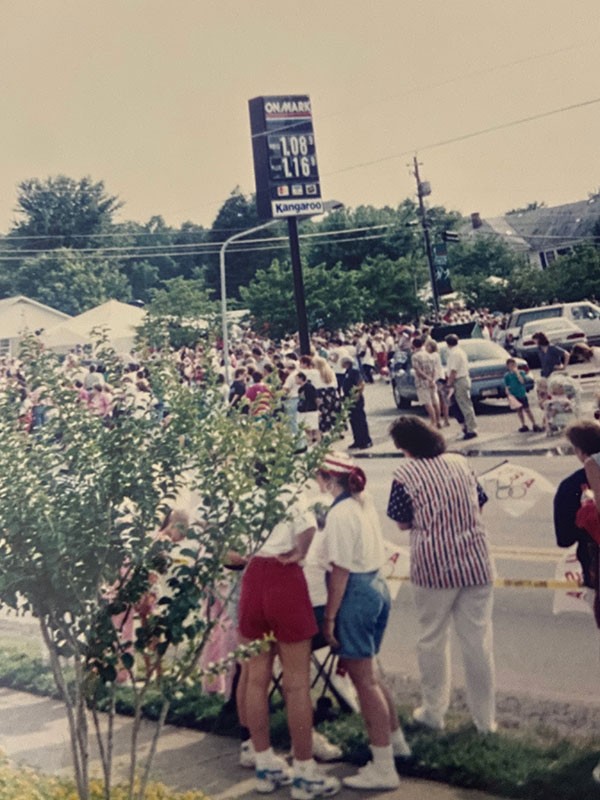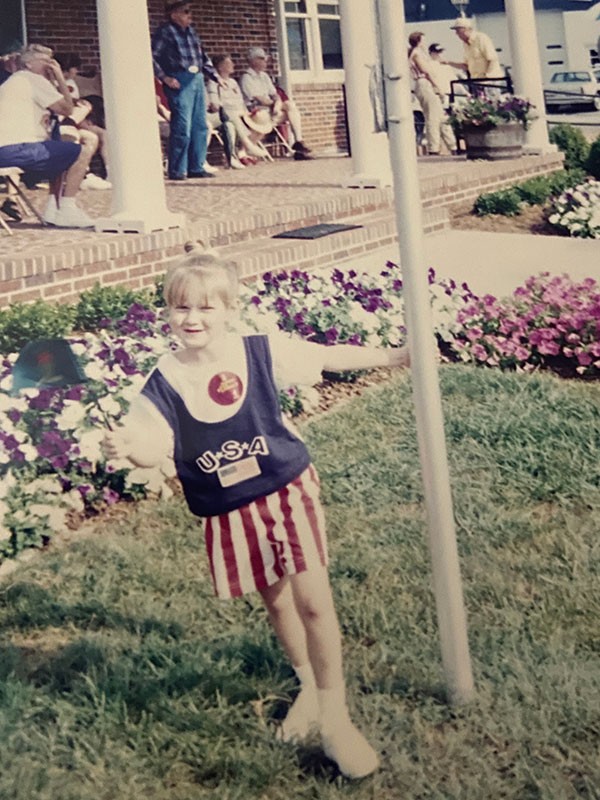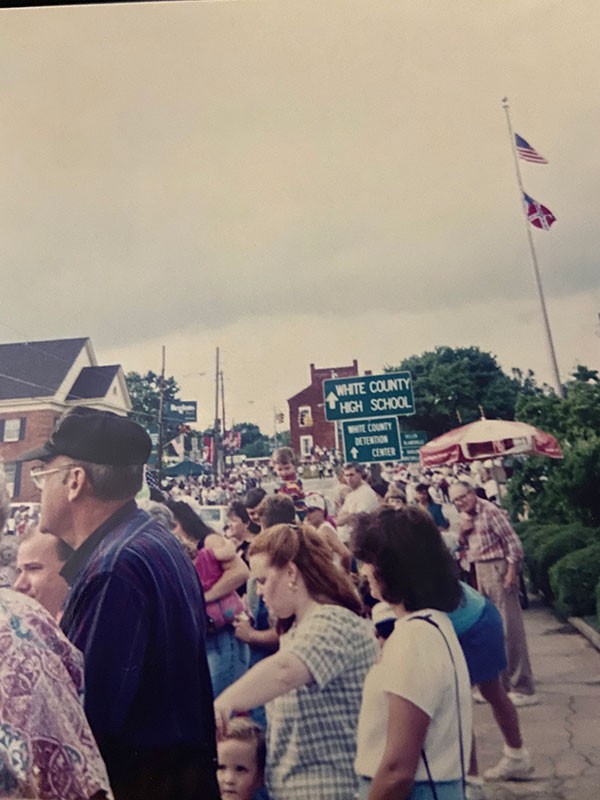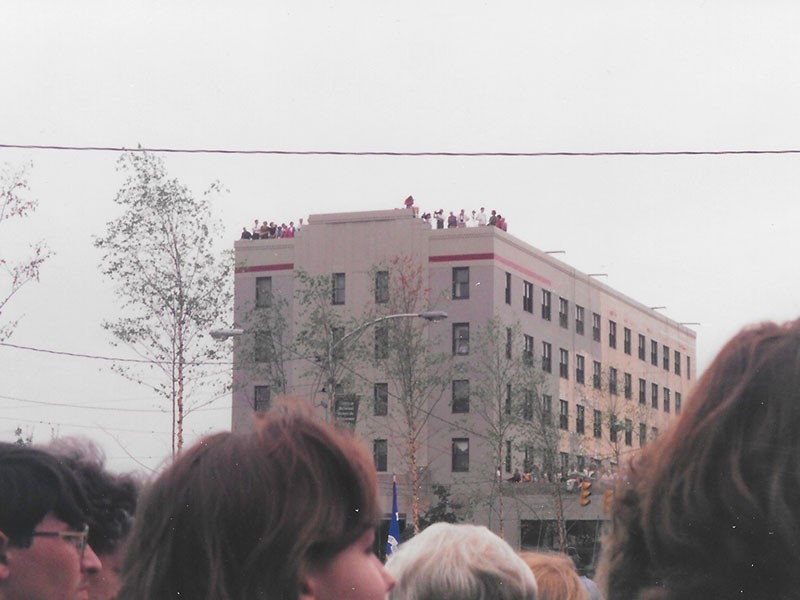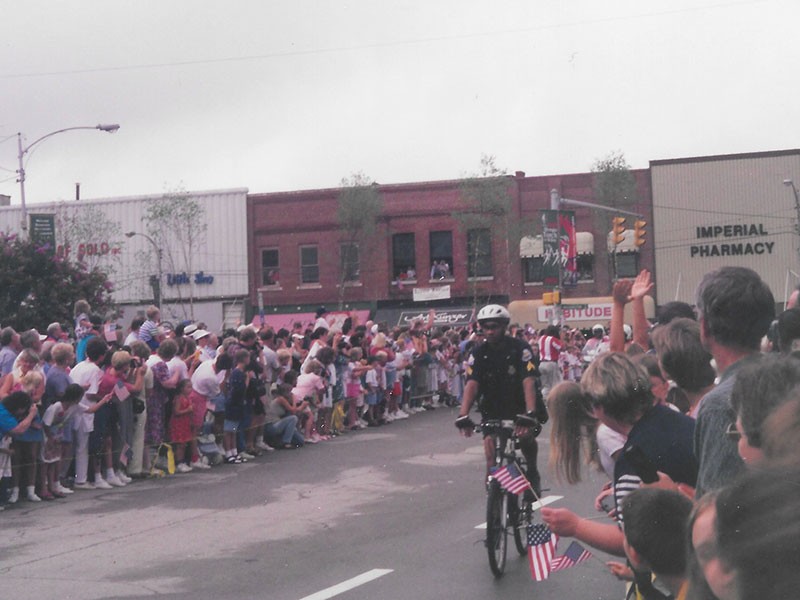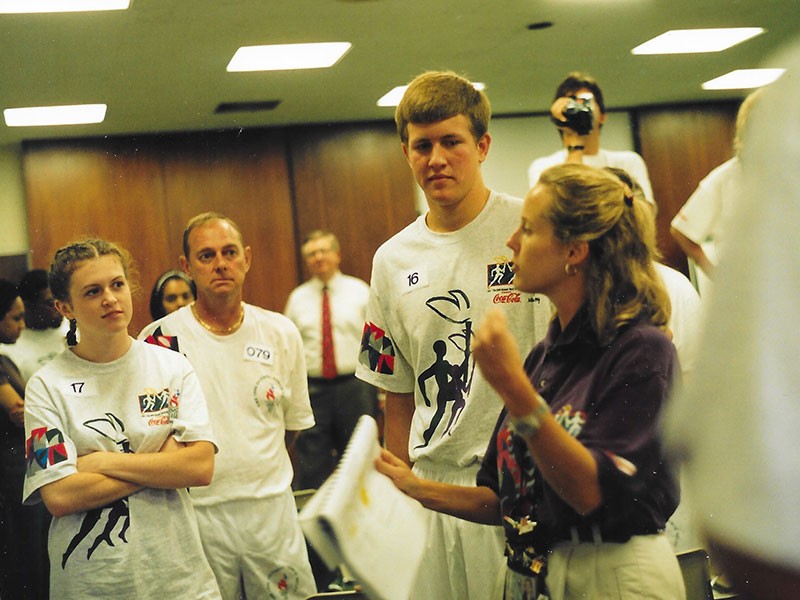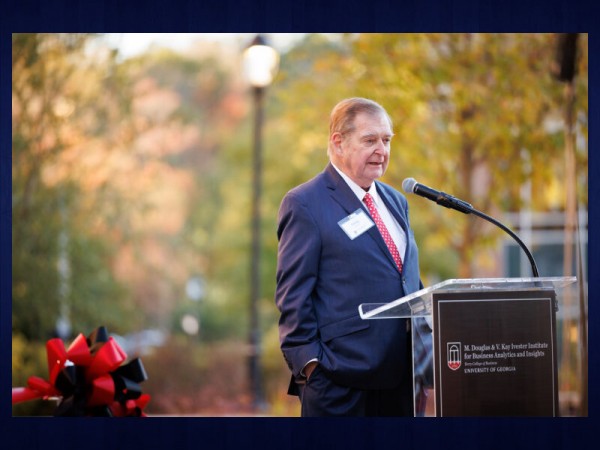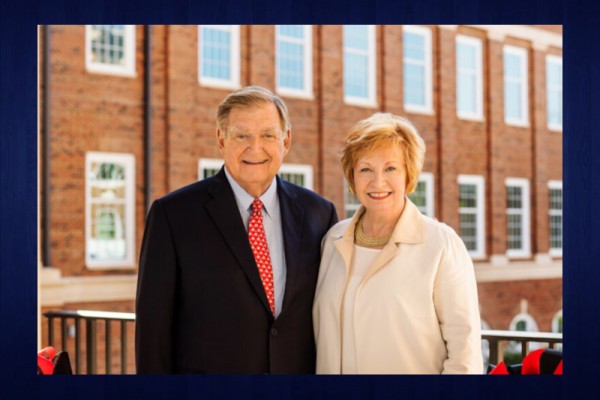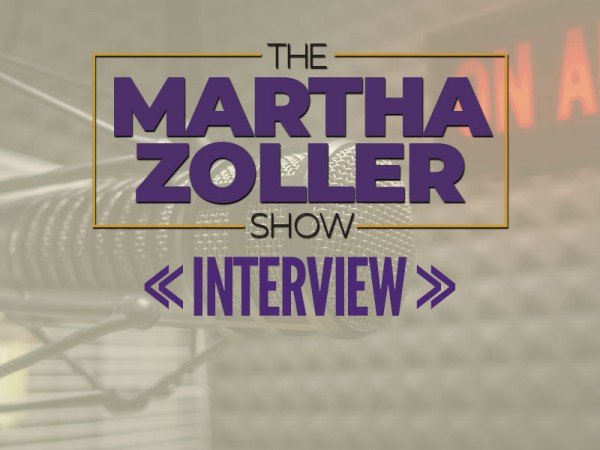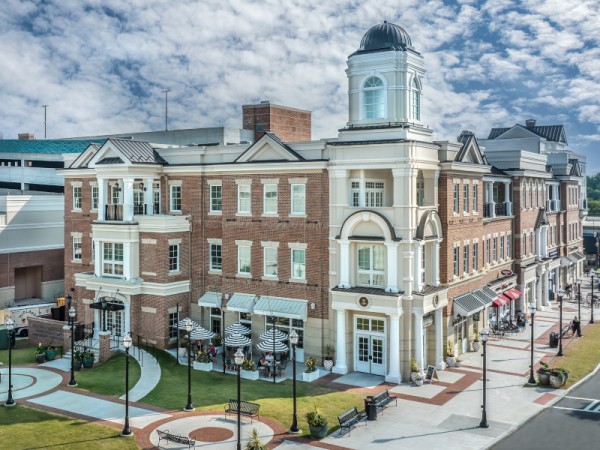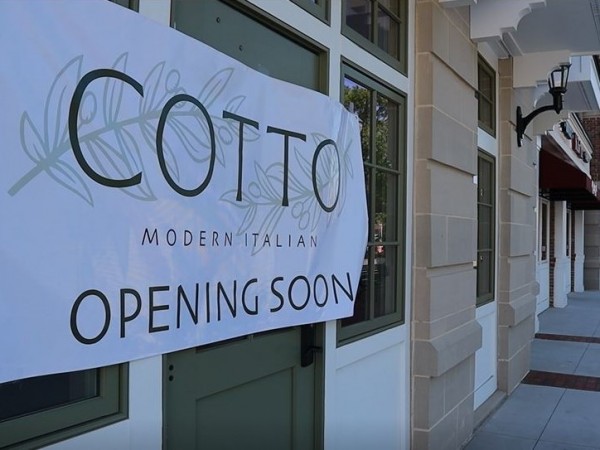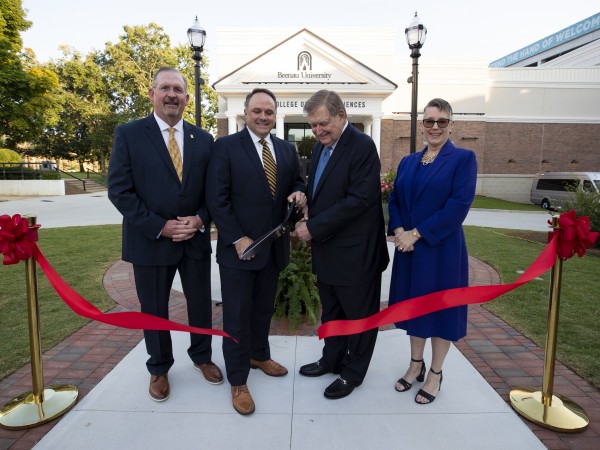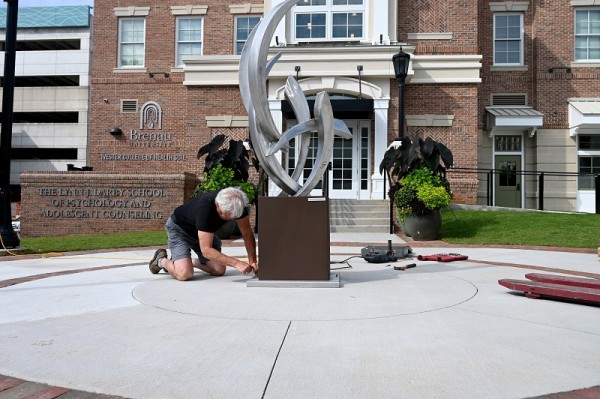We asked our readers to share their memories of the Olympic Torch Relay as it weaved it way through North Georgia. Below are some of the stories shared with us. Click the image above to see a gallery of photos submitted by our readers.
Gainesville native Doug Ivester was a major player during the 1996 Olympics in Atlanta. As a chief executive at Coca-Cola, one of the Games' biggest sponsors, Ivester and his team were responsible for organizing and carrying out the 5,000-mile-plus Torch Reay before the Games and for hospitality for world leaders and other dignitaries during the Games.
But his favorite memory – by far, he says – is carrying the Olympic torch with his wife, Kay, around the square in Gainesville.
"It was one of the greatest days of our lives," he said. "It was such a wonderful day and it represented all that was good about America, all that was good about Gainesville. … It is far superior or far elevated to any other memory that I have of the Games."
Given his position with Coca-Cola, Ivester could have carried the torch anywhere along the route that started in Los Angeles.
"It was really my choice," Ivester said. "We decided we wanted to run in Gainesville, preferably around the square in Gainesville because it represented a lot to us and the moment represented a lot to us."
Ivester took the flame from Steve Gilliam, one of the co-chairmen of the committee that brought the rowing and kayak events to Lake Lanier. He carried it up Main Street and around the square. But unlike many of the other torch bearers, Ivester didn't run. He walked, he said, to savor every moment of the event.
"There was a tremendous amount of pride in the involvement, in the Olympics themselves, but in our case a tremendous amount of pride in the city of Gainesville and the citizens of Gainesville," he said. "Gainesville did fantastic job of preparing for it, hosting the world for the rowing activities that took place, as well as escorting the torch. I was really proud of Gainesville."
* * *
A letter in the mail carried with it some surprise news for Justin Pressley. That’s how he found out he was going to get to carry the Olympic torch.
When Justin was 16, he was injured and became a quadriplegic. He became actively involved in disability rights and served on many local boards. Through his work, he met Stephanie Wells who nominated him to carry the torch, when he was just 24 years old.
According to his mother, the opportunity meant a lot to Justin. “We just got a letter in the mail. He was thrilled,” remembered Vicki Pressley. “It was an important event to be chosen. I think he realized that a lot of people were probably submitted to carry it that were not chosen. So, he knew it was an honor.”
Vicki remembered that Justin watched the torch go down the street in Gainesville in front of Citizens Bank, where he worked at the time. Then he traveled to Habersham County, where he got to carry his torch in Cornelia. When he arrived, someone mounted the torch to his wheelchair so that he could wheel himself.
"A lot of family and friends came to watch him. He was excited. The lady lit his torch and when she lit it, a motorcycle rode beside him. And he took off in his chair.”
As a quadriplegic, he didn’t have hand and finger movements, but he could use his joystick, using the muscles in his shoulder, to drive his chair himself.
Vicki said that Justin impacted a lot of people through his disability work in the community. She believes that is why a community member nominated him, as a tribute to his work and the impact he made. “It was an exciting time and an important time for him and something he was always happy to talk about. He made a difference. He really made a difference,” said Vicki.
Justin passed away Aug. 3, 2018 following complications from the flu and pneumonia. His mother still has his torch.
* * *
Jeff DeFoor heard about an essay contest at North Hall High School in which winners would get to escort '96 Olympic torch runners during the relay. He entered the contest and found out later he had snagged a spot.
He and two other escorts ran alongside Jim Mathis, Sherrie and Lorrie Schrage, and Evanda and Jim Moore.
"A friend of my parents, Evanda Moore, she let me carry it for a little while, so that was neat," he said. "Not long, but I remember she let me carry it for a little bit just to experience it."
DeFoor said that moment was his favorite from the experience.
After his quarter mile was completed, DeFoor said he got to enjoy the relay from a shuttle car as other escort runners completed their portions of the relay.
* * *
Before Will Lockwood was a bailiff for Habersham County, he worked for Standard Telephone Company and was one of Habersham County's 11 torch bearers.
"It's just unreal - you can't imagine the feeling," he said. "During the relay, I was the only person worldwide doing what I was doing. Nobody else in the world was carrying a torch except myself."
Lockwood, described by his co-workers as a community icon and philanthropist, not only carried the torch through a section of Habersham County, but he also brought its light to his boss, who was stricken with cancer during the Games.
"He was in a wheelchair and he was afraid of the crowds, so several of us at Standard Telephone Company said, 'Richard, if you'll come, we'll reserve you a place, we'll put you in a place you can see and be close to the relay,'" said Lockwood. After explaining the situation, the relay supervisor allowed Lockwood to make a detour, breaking the relay for a moment to share the torch with his boss.
Lockwood, who was about 55 when he carried the torch, keeps a hearty scrapbook detailing his Olympic experience along with his torch, though he continues to spread light without carrying it through town.
* * *
Bert Elder described his time carrying the torch as "one of the highlights of my life."
"You know, it's up there...it's something I will value as a memory, just a tremendous event," said Elder.
As a Jefferson native, Elder said the best part of carrying the torch was doing so in his hometown.
"I've heard there were probably about 2,000 people there, lining the roads and then on the square in downtown Jefferson...they had a big stage set up for a ceremony downtown," said Elder. "[It] was especially meaningful for me, since I grew up there."
Elder said he took the torch from the crest of the hill on old Athens Street to the downtown square. Unlike some of the other torch bearers who chose to walk their route, Elder actually ran with the torch.
"It was just kind of overwhelming, the whole atmosphere, and so I did [run]," Elder chuckled. "I've always been a runner too, so that was kind of up my alley."
Elder said he was surprised when he got a letter saying he had been selected to participate in the Olympic Torch Relay. He said his mother saw a request for volunteers in the local paper and asked if she could submit his name.
"At the time I'm thinking, 'Oh, there's no way I'm going to get it,'" he said. "And I remember getting a letter in the mail - I guess it was in February before the actual Olympics in '96 - and opening it and reading that I'd been accepted to run the torch in Jefferson."
Elder said he kept the torch he ran with, and it is now displayed in his home mounted on a wooden plaque. Next to it he keeps some photos of the day and a bronze plaque with a photo of the United States with the torch route for the 1996 Olympics.
* * *
At the time of the 1996 Olympic Torch Relay, one Georgia State Patrol trooper traveled across the United States with the flame after he was assigned to security at various celebration sites.
Robbie Haley of Clarkesville, who is now retired, said he had one recurring feeling as he visited 38 different states during his time with the torch relay.
“People, no matter where they were, reminded me a lot of back home,” Haley said. “They were so nice, so genuine … everybody loved where they lived, loved their community and just loved living in the United States.”
Haley said he could not recall how the opportunity came up, but he does remember that he started his tour in San Francisco.
While he was not an official torch runner, Haley said he did get the opportunity to run the torch one day when a spot needed to be filled in the runner schedule.
“I can’t remember what state it was, but a couple of us got to run the torch one day,” Haley said. “I had a kid running by me that was a volunteer, and I carried it for a little bit and just handed it over to him and let him go … I just let him carry it because it was his hometown.”
Haley said another one of his favorite moments from the relay was when the flame was airlifted to a small island in Maine, a state which was not included on the official torch relay map.
“There was a freshman hockey player that got a scholarship, and in his first game there was a terrible sports accident, and he was paralyzed, and all he wanted to do was see the flame,” Haley said.
Haley said he had never driven through three separate states so fast in his life, as he ventured to Maine for the impromptu relay.
Overall, Haley said the experience is one moment from his life that he will never forget.
“It was just a human experience, a lot of human love, a lot of human pride of being an American and just helping each other out,” Haley said.
* * *
Years before the term "bucket list" was popularized, J.C. Smith of Gainesville had one. He had written down 100 things he wanted to do, places he wanted to see, events he wanted to be part of. One of the items on that list was carrying the Olympic torch.
Smith said he placed the torch relay on his list after a friend participated in the run prior to the Lake Placid, New York Olympic Games in 1980. When he learned Atlanta would host the Games in 1996, he realized he might get the chance to fulfill that dream.
The 68-year-old Smith said he remembers very well the day he found out he would be part of the relay team.
"At that time, I was working for the University of Georgia here in Gainesville, but I also was teaching on an adjunct basis at Brenau [University]. I was going to teach that night at Brenau - I had found out that afternoon - and the first people I told were my class. You know, they were kind of pumped up," Smith said.
Smith's leg of the relay was in Cleveland; he ran a stretch of road just off the downtown square past the old Babyland General location. He called the experience "surreal."
"People were everywhere we went that day," Smith said. "People wanted to be a part of it and see it. Even along my little stretch, there were people all along the side of the road."
In a nod to the Greek origins of the Games, Smith's wife Cathryn extended the fun of the relay by hosting a toga party for him. It was there Smith was able to share the experience with his friends, many who had their photos taken with him and his torch.
The torch Smith carried on July 15, 1996 is on display at his home in East Hall County. More important than the torch itself, though, is the bond he shares with his fellow relay participants.
"I spoke to Sherrie Schrage not too long ago and we were talking about the torch relay and they (Schrage and her husband Lorrie) still have special memories. Joe Biddy - whenever we talk, we call each other 'Torch,'" Smith said. It's something that will always stay with us, I think."


